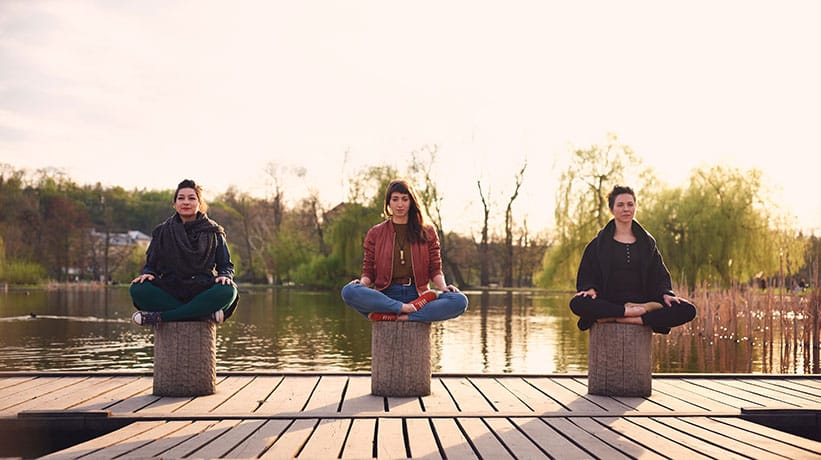How Long Should I Meditate?
Category: Beginners Guide to Meditation | How to Meditate | Popular

For those new to meditation or thinking about starting, some common questions that crop up are How long should my meditation session last? How long is long enough? Do I have to do this forever or will a few weeks or months suffice?
Behind these questions there may be a fear of not reaching a goal that has been set, or not attaining a result that’s hoped for… or simply not having enough time to accomplish the practice. Even though every meditator has a unique personality, strengths and learning curves, there are some basic guidelines that apply to just about everybody.
What’s the recommended dosage?
Many studies seem to conclude that just 20 minutes of mindfulness meditation per day can result in significant benefits. That’s all it takes, in most cases, to enhance brain functioning and overall physical and mental health. That said, this finding doesn’t mean that meditating for shorter sessions is a waste of time! Shorter sessions are great when you want to remember to take mindful breathers during your busy day – at home, at work, in school or in the park. Short sessions are also great when you’re a beginning meditator trying to find your groove.
On the other hand, you shouldn’t limit your meditation exercises to 20 minutes daily – if you benefit from meditating for longer periods, that’s great! Because meditation raises your awareness of what is good for you and what isn’t, you’ll naturally know when you want to stop meditating because you’re feeling lazy versus when you’re truly “maxed out.” Simply let your meditation experience be your guide.
When we consistently meditate for two months or more, a noticeable restructuring occurs within the brain. Researchers from Harvard University carried out an intensive study to figure out exactly what happens to our brains when we meditate regularly over time. 16 participants were put through a guided meditation program that lasted for 27 minutes each day for 8 weeks in total. When the two months were up, the researchers observed that the regions of the brain associated with memory, learning, emotion control, self-awareness and perspective increased in volume. These results were frankly enlightening! They seemed to indicate that setting aside even a few minutes each day could make a significant difference.
Sitting for long hours in meditation
Some meditators are attracted to the concept of practicing for long hours at a time. They may be inspired by images of Buddhist practitioners, monks or nuns, who seem to meditate blissfully for hours without taking a break. Most people who sit for long periods have trained progressively over months and years. Especially for those who meditate on their own, intensive sitting requires a high degree of practice and discipline. If you’re compelled to meditate intensively like these monks and nuns do, you must either connect with a qualified meditation teacher to ensure that you have the proper guidance, or join a structured meditation retreat run by competent guides.
The advantage of setting time aside to do nothing but meditate is that there are fewer distractions and the mind has time to really settle down into mindfulness and awareness. An image associated with this is of a jar of agitated, murky water. Once the jar is set down and the contents have time to settle, the impurities sink to the bottom and the water becomes clear. The same goes for the mind. Retreats can last from half a day to… years! A good teacher can help you determine what’s most beneficial for you.
The benefits of meditation arise from making the most of each moment
The benefits of meditation are priceless, regardless of whether you prefer short or long meditation sessions. Rather than worry about how many minutes, hours or years you should sit, try making the most of every practice moment. It’s all about quality, not quantity. Choose a convenient time free of interruptions and noise. Mornings are often recommended, although you can also incorporate mini-meditations within your day or choose evenings as your preferred time. Make sure you’re seated in a comfortable position before you start your session. There are many worthwhile meditation techniques you can practice. If you get tired with sitting, switch it up with walking meditation. The whole idea is to keep meditation fresh and enjoy your meditation moments.
A daily sitting meditation practice can transform your life and give you the results you desire. Meditation isn’t like going to school: there’s no kindergarten; there’s no graduation. For a lot of people, it’s more like brushing your teeth: it’s hard to imagine spending a whole day without it. And you do it because a) you enjoy it, b) you feel better than if you’d skipped it and c) it is undeniably beneficial.
To help you navigate meditation’s highways and byways, the Mindworks meditation courses are one of the best online meditation platforms out there. It’s chock full of great resources that can help you grow from a beginner to a seasoned meditator in no time flat.






